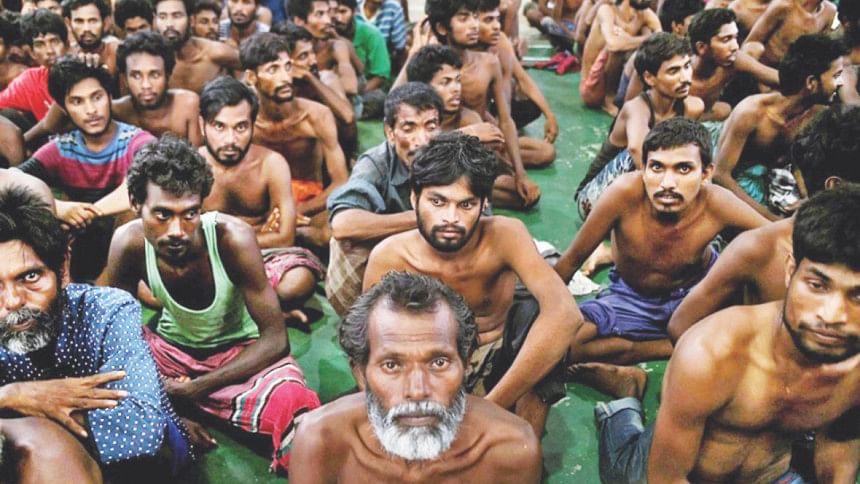The B&W of world demography

May11, 2015, The Sydney Morning Herald,Bangkok: Thousands of long-persecuted Rohingya Muslims fleeing Myanmar are believed to be stuck at sea on people-smuggler boats, unable to land because of a crackdown on illegal trafficking networks in Thailand and Malaysia, officials and refugee activists say.
But the networks extend far beyond those identified in the crackdown and include Thai fishing boats that have transported tens of thousands of asylum seekers from Myanmar and Bangladesh, they say.
Two boats carrying about 600 migrants washed ashore in western Indonesia's Aceh province on Sunday, including some women and children weak from a lack of food and water and needing medical treatment.
May 20, 2015 CNN: Thousands of Rohingya migrants remain stranded in the Andaman Sea, while authorities around the region refuse to take them in.
The scale of the crisis is still unknown. No organisation, from the UNHCR and the International Organisation for Migration (IOM) to Rohingya rights groups, knows how many boats there are. The number of migrants stranded aboard these ships, however, is estimated to be in the thousands.
Despite a plea from U.N. Secretary General Ban Ki-moon, urging Southeast Asian leaders to uphold "international law" and "the obligation of rescue at sea," Malaysia, Thailand and Indonesia arecurrently refusing to accept the "boat people" -- men, women and children -- who remain on ships, with rapidly dwindling provisions.
Thailand supplied them with food and water in the middle of last week, the last confirmed resupply.
CNN understands that the ships, which remain at sea, are trying to elude patrols and the refugees are effectively being held prisoner by their smugglers. Official sources, who have requested not to be named, say the smugglers may be telling people they can only accept landing rights in Malaysia as the smugglers are possibly Thai and wish to avoid what has become a very high-profile issue.
Bangkok May 27, 2015: Rohingya and other survivors of dangerous boat voyages from Burma and Bangladesh describe horrific treatment by unscrupulous smugglers and traffickers in Burma, and abuse and neglect aboard ships, Human Rights Watch said today.
June 14, 2015, FareedZakaria, CNN Host: This is GPS, the GLOBAL PUBLIC SQUARE.
Next on GPS, how in the world do you get people to have more babies? Believe it or not, this is a burning question for governments around the world. We will bring you some of their best ideas. You'll probably try them at home.
ZAKARIA: Now for our "What in the World" segment.
Something is odd in the state of Denmark. A Danish travel company has been wooing Danes to take a romantic trip abroad, pointing out that Danes have 46 percent more sex on holidays and that 10 percent of Danish children are conceived during vacations.
The ad offers a three-year supply of baby goods if a couple concedes on their trip before delivering this memorable catch phrase.
ZAKARIA: What in the world is going on?
Denmark and other countries are very worried about their stagnant aging populations. According to the U.N., the average woman needs to have 2.1 children to maintain the population of a developed country. But in the European Union, every single country is below that 2.1 level including Denmark. By 2050 some countries like Greece, Portugal and Germany will see their populations drop by double-digit percentages according to Pew.
Japan is the poster child for this population crisis. Its government projects that it will lose over two million people in just the next five years. By 2050 it will have lost 1/5 of its total population and there maybe only 43 million in Japan by 2110. Not only will some countries' population shrink they will also get older. Europe's over 65 crowd will increase to over a quarter of the population there by 2050, according to the U.N. Japan's will be over 1/3.
That means that already cash-strapped countries will have higher bills to pay to provide retirees with pension and health benefits.
So, it's no wonder that Denmark and other countries are getting creative to promote procreation. The Japanese government has funded matchmaking events, South Korea's government is trying to reduce the extravagant price of weddings to encourage more marriage, working with religious organizations to cut costs, according to "The Korea Herald." A region in Russia encouraged citizens to bear a patriot on June 2012, Russia Day, offering money, refrigerators and even cars.
And in 2012, Singapore was treated to national night.
ANNOUNCER: A national night. And I want a baby.
ZAKARIA: A campaign to encourage baby making on Singapore's national holiday. So, are these kinds of measures actually working? Demographers told us that in general it's difficult to get people to have children purely using financial incentives. That said, France has championed child-friendly policies like paid family leave for parents of newborns and preschool for three-year-olds and its fertility rate is one of the best in Europe. In the United States, the fertility rate hit a record low in 2013 according to the CDC, but Pew still predicts that America's population will actually grow by 27 percent from 2010 to 2050. Why? One big reason is immigration. The U.S. has a younger population than Europe to begin with, and it takes in lots of immigrants. And immigrants tend to have more children than native-born Americans.
So the United States, compared to many other large, rich countries in the world, will be demographically vibrant and growing for decades, and immigrants will help drive that growth. I am guessing that is an ad that no one is going to make anytime soon in America.
The author is a practising Architect at BashaBari Ltd., a Commonwealth Scholar and a Fellow, a Baden-Powell Fellow Scout Leader, and a Multiple Paul Harris Fellow-cum-Benefactor Rotarian

 For all latest news, follow The Daily Star's Google News channel.
For all latest news, follow The Daily Star's Google News channel. 



Comments